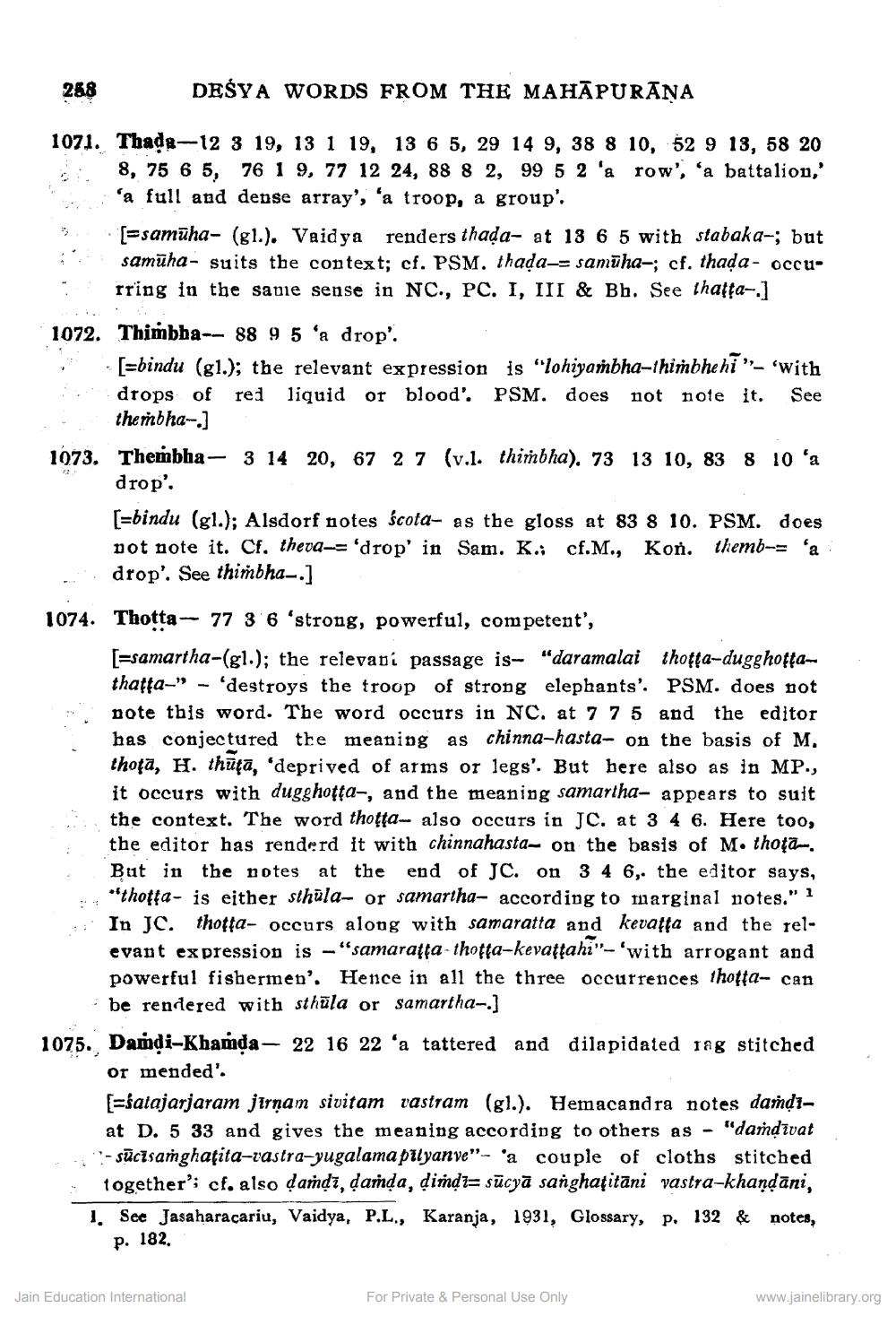________________
288
DEŚYA WORDS FROM THE MAHĀPURĀNA
1071. Thada-12 3 19, 13 i 19, 13 6 5, 29 14 9, 38 8 10, 52 9 13, 58 20
8, 75 65, 76 1 9, 77 12 24, 88 8 2, 99 5 2 'a row', 'a battalion,' 'a full and dense array', 'a troop, a group'. [=samūha- (gl.). Vaidya renders thada- at 13 6 5 with stabaka-; but samüha- suits the context; cf. PSM. thada-- samūha-; cf. thada- occurring in the same sense in NC., PC. I, III & Bh. See Thatta-.]
1072. Thimbha-- 88 9 5 'a drop'.
[=bindu (gl.); the relevant expression is "lohiyambha-Thimbhe hi'- 'with drops of red liquid or blood'. PSM. does not note it. See
thenbha-] 1073. Thembha - 3 14 20, 67 27 (v.l. thimbha). 73 13 10, 83 8 10 'a
drop'. [=bindu (gl.); Alsdorf notes scota- as the gloss at 83 8 10. PSM. does pot note it. Cf. theva-s 'drop' in Sam. K.; cf.M., Kon. themb-= 'a' drop'. See thimbha..]
1074. Thotta-- 77 3 6 'strong, powerful, competent',
[=samartha-(gl.); the relevant passage is- "daramalai thotta-dugghoftathatfa" - 'destroys the troop of strong elephants'. PSM. does not note this word. The word occurs in NC. at 7 7 5 and the editor has conjectured the meaning as chinna-hasta- on the basis of M. thota, H. thūtā, 'deprived of arms or legs'. But here also as in MP., it occurs with dugghotta-, and the meaning samartha- appears to suit the context. The word thotta- also occurs in JC. at 34 6. Here too, the editor has renderd it with chinnahasta, on the basis of M. thota. But in the notes at the end of JC. on 3 4 6,. the editor says, "thoffa- is either sthūla- or samartha- according to marginal notes." 1 In JC. thotta- occurs along with samaratta and kevaffa and the relevant expression is - "samaraffa-thoffa-kevattahi"- 'with arrogant and
powerful fishermen'. Hence in all the three occurrences thotta- can
· be rendered with sthūla or samartha-.] 1075. Damţi-Khamda- 22 16 22 'a tattered and dilapidated iag stitched
or mended'. (=saiajarjaram jirnam sivitam vastram (gl.). Hemacand ra notes damdiat D. 5 33 and gives the meaning according to others as - "dardivat - sūcīsamghatita-vastra-yugalama pilyanve"- 'a couple of cloths stitched together'; cf, also damdi, damda, disdz= sūcyā sanghațitāni vastra-khandani, 1. See Jasaharacariu, Vaidya, P.L., Karanja, 1931, Glossary, p. 132 & notes,
p. 182.
Jain Education International
For Private & Personal Use Only
www.jainelibrary.org




